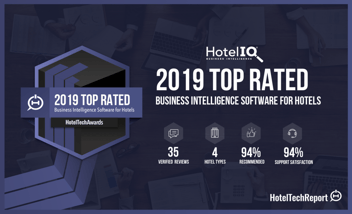HotelIQ Named Best Business Intelligence Software in the 2020 HotelTechAwards
Read MoreTable of Contents
In today's fast-paced and competitive hospitality industry, hotels are constantly striving to stay ahead of the game. One of the most effective ways to do this is by harnessing the power of business intelligence. Hotel business intelligence refers to the process of collecting, analyzing, and utilizing data to make informed decisions and drive operational efficiencies.
In this blog post, we will delve into the world of hotel business intelligence, understanding its importance in the hospitality industry, exploring its key components, and providing practical tips on how to implement it effectively in your hotel.
Why Business Intelligence is Crucial for Hotels
Understanding the Role of Data in the Hospitality Industry
Data plays a vital role in the success of any hotel. From guest preferences and booking patterns to revenue and marketing trends, data provides valuable insights that can be leveraged to improve operations and enhance guest experience. Business intelligence enables hotels to tap into this data and gain a competitive edge.
Improving Operational Efficiency
By analyzing data, hotels can identify inefficiencies and bottlenecks in their operations. This allows them to streamline processes, optimize resource allocation, and ultimately improve operational efficiency. From front desk operations to housekeeping and inventory management, business intelligence helps hotels run smoother and more cost-effectively.
Enhancing Guest Experience
Understanding guest preferences and behavior is essential for hotels looking to provide a personalized and memorable experience. Business intelligence empowers hotels to analyze guest data, such as booking history, feedback, and social media interactions, to tailor offerings and services accordingly. This leads to higher guest satisfaction and increased loyalty.
Informed Decision Making
Gone are the days of relying on gut feelings and guesswork. Hotel business intelligence provides actionable insights that enable hoteliers to make informed decisions. From pricing strategies and revenue management to marketing campaigns and investment decisions, data-driven decision making is key to staying competitive in the dynamic hospitality industry.
Key Components of Hotel Business Intelligence
Data Warehousing
Data warehousing involves the collection, storage, and organization of data from various sources within a hotel. This centralized data repository serves as the foundation for business intelligence, allowing for easy access and analysis of information.
Data Mining
Data mining refers to the process of extracting valuable patterns and insights from large datasets. By applying algorithms and statistical techniques, hotels can discover hidden trends, correlations, and anomalies in their data, helping them identify opportunities and make data-driven decisions.
Predictive Analytics
Predictive analytics involves using historical data to forecast future trends and outcomes. Hotels can leverage predictive analytics to anticipate demand, optimize pricing, and make proactive decisions to maximize revenue and operational efficiency.
Reporting and Visualization Tools
To derive meaning from data, hotels need effective reporting and visualization tools. These tools present data in a clear and visually appealing manner, enabling hoteliers to easily interpret and act upon the insights gained from the data analysis.
Implementing Business Intelligence in Your Hotel
Choosing the Right BI Tools
Selecting the right business intelligence tools is crucial for successful implementation. Hotels should consider their specific needs, budget, and IT infrastructure when choosing tools that are user-friendly, scalable, and capable of handling their data requirements.
Training Staff on BI Usage
Implementing business intelligence is not just about the technology; it also involves training and educating staff on how to effectively use the tools and interpret the data. This ensures that everyone in the hotel is equipped to make data-driven decisions and contribute to the success of the business.
Creating a Data-Driven Culture
Lastly, hotels must foster a culture that values data-driven decision making. This involves promoting data literacy, encouraging collaboration between departments, and regularly sharing insights gained from business intelligence initiatives. A data-driven culture ensures that business intelligence becomes an integral part of hotel operations.
%20(1).png?width=400&height=124&name=21051_HotelIQ_logo_BJ_PB_DM_GR-05%20(1)%20(1).png)




Comments